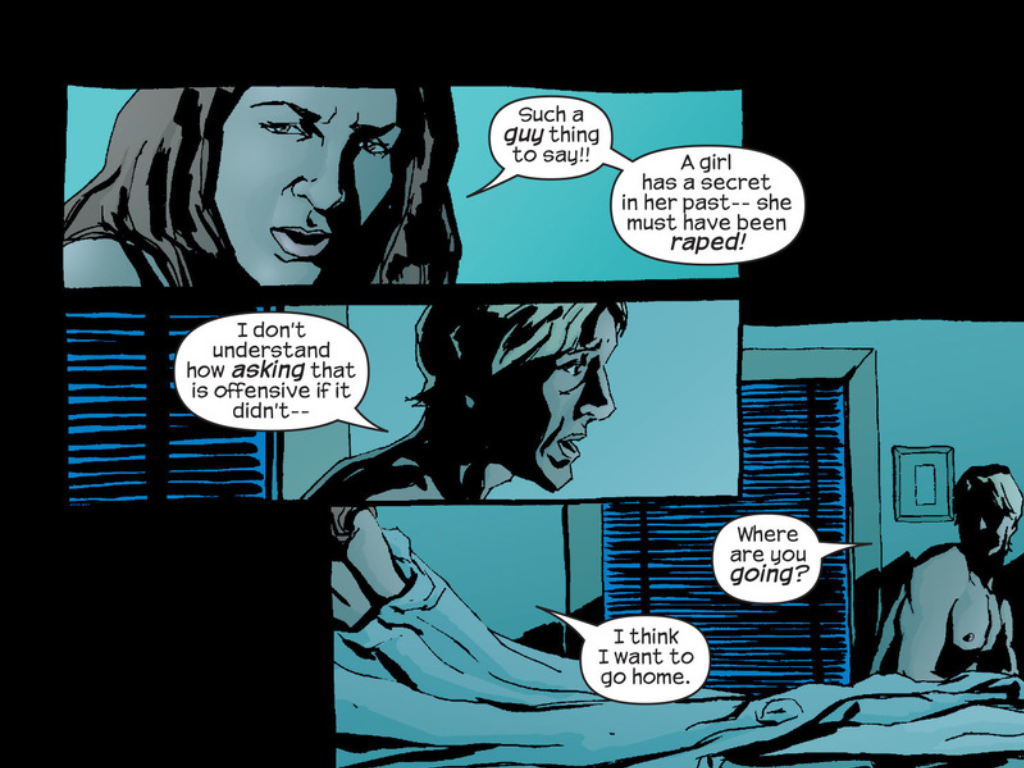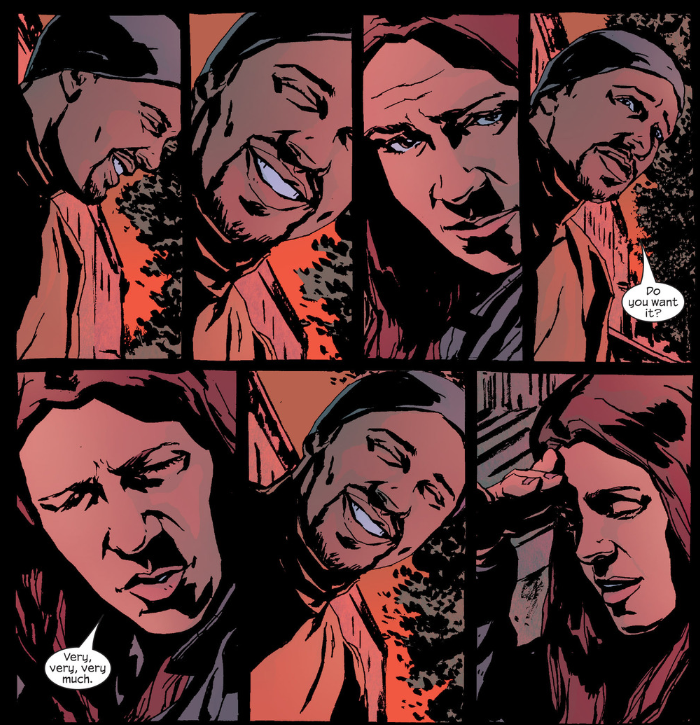Happy Monday! It’s time for another installment of Angry Feminism by Gin Jenny, this time aimed at Brian Michael Bendis and Michael Gaydos’s Alias, the comic on which the Netflix Jessica Jones show is (loosely) based. Ready? Let’s get into it! This review will be broken up into two parts, one where I come not to bury Alias but to praise it, and then one where I have an enormous BUT and some further thoughts on Feminism.

The bulk of Alias is a procedural story about Jessica Jones, Private Eye. I like this about Alias. If I had a complaint about the show (well, I had many), it was that we rarely get to see Jessica Jones actually pursuing her actual career. She does the minimum amount of PI-ing that can be called PI-ing, like Keith Mars isn’t even the star of his show and he does way more on-screen PI-ing than Jessica Jones in Jessica Jones. Whereas in Alias, each mini-arc is about a specific case that Jessica has to solve: cheating spouses, missing persons, exactly what you’d expect.
She’s also a complicated, not-always-likeable person, and the comic does not ask us to hold this against her. We know that there’s some bad stuff in her past (hello, superhero?), but even before Bendis tells us what this is, we’re meant to be on her team as regards her choices re: costumed heroism; and in fact, we’re meant to be on her team altogether, while also recognizing that she makes mistakes and bad decisions and this is part of her too. So that’s a great look for a female-led comic, particularly one that came out in the early aughts.
You can tell that Bendis is trying not to fall into gross, overused tropes of female trauma. He really is trying. Ant-Man, who Jessica dates for a while, comes off reeeeeal Nice-Guy-ish, and she has to legit run away from him yelling “RESPECT MY BOUNDARIES SCOTT.” And there’s another scene in which he asks her — not in an unkind way — if she’s been raped, to which she answers this:

I gotcha, Bendis. I see what you’re trying to do there, buddy. I see that you are making an effort there and I appreciate it.
But you know how I have talked in this space before all about how it’s a problem to locate the value of women characters in their bodies? Well, one thousandth verse, same as the first. In the last issue of Alias, Bendis loses a huge chunk of my goodwill for this series by ending the story in the following asinine way: Jessica reveals her woeful backstory to Luke Cage, how Killgrave made her watch while he raped a whole bunch of other women and also made her beg him to love her. Here in the present, Killgrave escapes from prison. She has the power to escape his mind control for Reasons (fine), so she kills him. Then she goes find Luke Cage to tell him she’s pregnant with his child, and this fuckery ensues:

Yo, just like: Okay. Let me just — okay. Jessica has never talked about wanting a child before. This is super out of nowhere. For this to work as a final scene, Bendis is banking on the reader accepting the premise that all ladies want babies. That is number one.
(Do I need to say this, actually? I guess yes? Dude writers, your attention please: Not all ladies want babies. If you want us to buy “pregnancy” as a happy, or even a happyish ending, you need to set it up emotionally prior to pulling the trigger. But you should still probably have a lady read over what you’ve written. Dudes assuming they know what ladies want to do with their bodies is, let’s say, somewhat fraught.)
Number two, returning to that earlier panel about Jessica having been raped, I know I said I appreciated the effort, but I didn’t appreciate it that much. Killgrave’s treatment of Jessica lets Bendis garner cookies by showing awareness that Lady Comics Readers are tired of rape backstories (yes we are). But it’s all still framed like rape. Jessica is triggered during sex. She heavily identifies with young women who appear to have been abducted or assaulted. In a flashback, she’s thrown into a state of dissociation following a particularly brutal command from Killgrave. And it all just feels like a dude comic book writer thinking “what can be a traumatic backstory for a lady person that isn’t rape but is still very traumatic indeed?” and being literally unable to come up with something that didn’t involve a woman’s ability to consent being taken away by a dude looking to dominate, humiliate, and overpower her.
THUS, this sudden pregnancy thing, which evidently we are supposed to root for because evidently it’s something our heroine wants, comes off super much as a corrective expression of Jessica’s womanhood following her triumph over her female trauma.
And look, I get that that wasn’t what Bendis was aiming at. But as women we are perpetually told that our value lies in remaining sexually pure; and, when we lose that purity, it lies in becoming a vessel for new life. It’s disappointing to watch Jessica punchmurder a character who responds to her deviance from the first half of that paradigm with violence and coercion, only to have the author assume her, and our, innate desire for her to align her life with the second half of it. It’s frustrating as hell, the more so because Alias and its creators have been much applauded for this portrayal of a complex female character and her recovery from trauma.
ETA: After writing and scheduling this post, the news came out that Brian Michael Bendis will be writing a new Iron Man comic featuring a black teenage girl named Riri. I believe in Bendis’s good intentions, both in Alias and in this upcoming Iron Man comic. I’m sure he wants to do and say the right things. But the pregnancy thing above is the perfect example of having good intentions and still getting it wrong. Hire some damn women of color, Marvel, and stop looking for praise behind infinitely reupping on the same white dude writers forever and ever.
This has been your Angry Feminism Minute. Tip your servers.